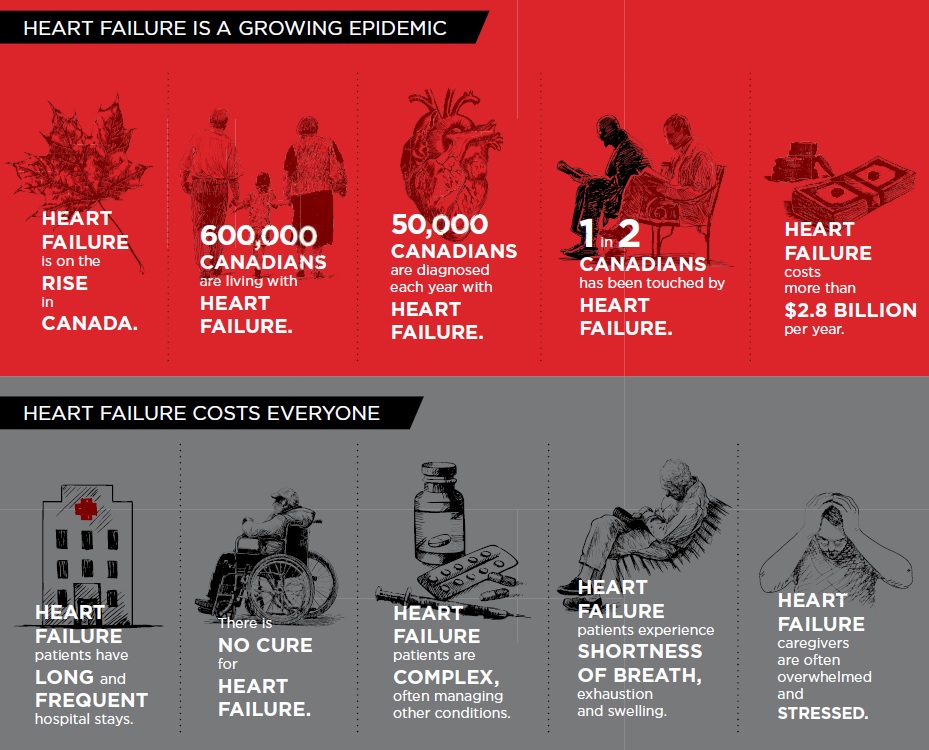On a daily basis, Karen Nicole has trouble breathing, falling asleep and getting through routine activities, such as grocery shopping or going out with friends. The 43-year-old has had open heart surgery, lives with kidney disease, and relies on a heart defibrillator to manage her irregular heartbeats.

Doctors diagnosed the Kingston, Ont.-woman with heart failure when she was 37. She is one of 600,000 Canadians living with heart failure. In a report released Tuesday, the Heart and Stroke Foundation says those numbers have nowhere to go but up.
It estimates that 50,000 new cases are diagnosed every year. The report warns that these numbers are slated to rise as more Canadians survive heart attack, live with heart disease and live longer, in general.
“I was shocked. I wondered what this meant for my life, and for my dreams, and my goals,” Nicole told Global News.
READ MORE: How heart disease has changed over the past 60 years
It was a slow decline until her diagnosis, Nicole recalled. She faced cardiac arrest when her heart stopped beating in her sleep. She was dealing with dialysis for her kidney disease and she battled with shortness of breath and sleeping in a position that kept her lungs upright.
Now, she takes medication to keep her heart and blood pressure in line.
“I wasn’t always doing my best. I was feeling exhausted all of the time and I caught pneumonia a few times and was hospitalized,” she explained.
READ MORE: Pay attention to stroke warning signs, Heart and Stroke Foundation says
Heart failure is a complicated and often misunderstood condition, but with more Canadians living with heart disease, its rates are steadily rising, according to a Heart and Stroke report released Tuesday.
“People understand heart attack and stroke, but they don’t know what heart failure is. They often get it confused with cardiac arrest, which means the heart stops beating entirely. Heart failure is a syndrome we see in patients that reflects a damaged heart that’s unable to pump blood effectively,” Dr. Paul Fedak, a cardiac surgeon at the University of Calgary and a Heart and Stroke Foundation researcher, told Global News.
“Most patients with heart failure have a very poor prognosis. It’s worse than many cancers so it’s a very serious diagnosis and a huge burden on our health care system,” Fedak warned.

Get weekly health news
READ MORE: Some Canadians misunderstanding stroke recovery process, report says
The report is shedding light on the condition that’s been overshadowed by other chronic diseases, such as diabetes and hypertension.
Fedak calls heart failure a “revolving door condition” because it can be triggered by a gamut of issues: multiple heart attacks or heart disease could damage the organ, infections in the heart valve, dealing with high blood pressure, diabetes, or genetics, electrical issues in pumping blood and even the aging process can lead to the onset of heart failure.
It’s when your heart’s shape and function is altered, making it difficult for it to adequately pump blood through your body.
READ MORE: 5 lifestyle changes to improve your heart’s health
Patients end up with:
Fluid accumulating in their bodies.
They gain weight.
They feel bloated and puffy.
Their lungs get “wet” with their breathing laboured.
They’re lethargic and have trouble carrying out simple tasks.
Ultimately, heart failure patients end up in hospital for extensive treatment for about one to two weeks for a “tune up,” as Fedak calls it. But doctors can’t cure the problem, so patients are hospitalized again months later.
READ MORE: Here’s how women’s heart attack symptoms differ from men’s
“It’s such a particularly difficult problem and it’s becoming so common and so resource intensive. Our system is extremely strained to begin with,” he warned.
The report suggests that almost half of Canadians think heart failure can be cured. Depending on the symptoms though, half of all heart failure patients die within five years of their diagnosis and most die within a decade.
It’s the third most common reason for hospitalization, according to data from the Canadian Institute for Health Information, trailing behind respiratory disease and heart attack.
READ MORE: Male heart attack patients receive faster care than women, Canadian study suggests
The Heart and Stroke Foundation estimates that heart failure costs the Canadian health-care system $2.8 billion annually. Each patient stays in hospital for about eight days on average.
Nicole works hard to make sure her condition doesn’t define her. She underwent cardiac rehabilitation and worked with a social worker, cardiologist and registered dietitian to make long-term lifestyle changes.
“I was able to transform my life using the guidance they gave me,” she explained. She works out at the gym among her peers who don’t grapple with heart disease, she noted.
READ MORE: Quarter of heart attack patients weren’t tested for diabetes or high cholesterol
Read the full Heart and Stroke report here.
(Courtesy Heart and Stroke Foundation)
carmen.chai@globalnews.ca
Follow @Carmen_Chai








Comments